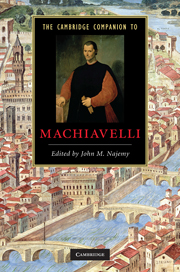Book contents
- Frontmatter
- Introduction
- 1 Niccolò Machiavelli: a portrait
- 2 Machiavelli in the chancery
- 3 Machiavelli, Piero Soderini, and the republic of 1494-1512
- 4 Machiavelli and the Medici
- 5 Machiavelli’s Prince in the epic tradition
- 6 Society, class, and state in Machiavelli’s Discourses on Livy
- 7 Machiavelli’s military project and the Art of War
- 8 Machiavelli’s Florentine Histories
- 9 Machiavelli and Rome: the republic as ideal and as history
- 10 Philosophy and religion in Machiavelli
- 11 Rhetoric and ethics in Machiavelli
- 12 Machiavelli and poetry
- 13 Comedian, tragedian: Machiavelli and traditions of Renaissance theater
- 14 Machiavelli and gender
- 15 Machiavelli’s afterlife and reputation to the eighteenth century
- 16 Machiavelli in political thought from the age of revolutions to the present
- Index
10 - Philosophy and religion in Machiavelli
Published online by Cambridge University Press: 28 September 2010
- Frontmatter
- Introduction
- 1 Niccolò Machiavelli: a portrait
- 2 Machiavelli in the chancery
- 3 Machiavelli, Piero Soderini, and the republic of 1494-1512
- 4 Machiavelli and the Medici
- 5 Machiavelli’s Prince in the epic tradition
- 6 Society, class, and state in Machiavelli’s Discourses on Livy
- 7 Machiavelli’s military project and the Art of War
- 8 Machiavelli’s Florentine Histories
- 9 Machiavelli and Rome: the republic as ideal and as history
- 10 Philosophy and religion in Machiavelli
- 11 Rhetoric and ethics in Machiavelli
- 12 Machiavelli and poetry
- 13 Comedian, tragedian: Machiavelli and traditions of Renaissance theater
- 14 Machiavelli and gender
- 15 Machiavelli’s afterlife and reputation to the eighteenth century
- 16 Machiavelli in political thought from the age of revolutions to the present
- Index
Summary
Writing to Machiavelli in June 1509, his friend Filippo Casavecchia warned him that his “philosophy” (“la vostra filosofia”) would never be comprehended by fools and that there were not enough “wise” people who did understand it. Casavecchia was referring to Machiavelli's foresight in contributing to the recapture of Pisa through the institution of the militia, which is not what we mean by philosophy today. Nevertheless, Casavecchia put his finger on the quality that contemporaries admired about Machiavelli, namely, the originality of his thinking in a broader context. Machiavelli never wrote systematically about his understanding of philosophical issues, to which ancient thinkers contributed as much as contemporary politics and religion, nor are we sure that his ideas can be described as a coherent whole. On the contrary, his view of the cosmos and of man's nature as unchanging seems difficult to reconcile with the flexibility he demanded in the field of politics, where his ideas about republicanism, princely rule, and religion seem equally at odds. The starting point for describing Machiavelli's outlook has always been his letter to Francesco Vettori on December 10, 1513, describing the origins of The Prince as the outcome of both practical political experience and the influence of the classics. The practical experience consisted of his work in the chancery and diplomatic missions, which stressed the importance of rules, models, and necessary procedures and encouraged in him a skeptical and somewhat fatalistic approach to life.
- Type
- Chapter
- Information
- The Cambridge Companion to Machiavelli , pp. 157 - 172Publisher: Cambridge University PressPrint publication year: 2010
- 11
- Cited by

